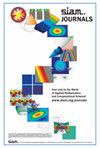NF-ULA:用于成像逆问题的规范化基于流量的未调整朗文算法
IF 2.3
3区 数学
Q3 COMPUTER SCIENCE, ARTIFICIAL INTELLIGENCE
引用次数: 0
摘要
SIAM 影像科学期刊》第 17 卷第 2 期第 820-860 页,2024 年 6 月。 摘要:解决逆问题的贝叶斯方法是经典方法的有力替代品,因为贝叶斯方法能够量化解的不确定性。近年来,用于求解逆问题的数据驱动技术也因其卓越的表示能力而取得了巨大成功。在这项工作中,我们将基于数据的模型纳入了一类基于朗之文的采样算法,用于成像逆问题的贝叶斯推理。特别是,我们引入了 NF-ULA(基于归一化流的未调整朗文算法),它涉及学习归一化流(NF)作为图像先验。我们使用 NF 来学习先验,是因为对数先验的闭式表达很容易理解,可以使用 autograd 库对其进行微分。我们的算法只需要一个基于归一化流的生成网络,它可以独立于所考虑的逆问题和前向算子进行预训练。我们通过研究由此产生的 NF-ULA 算法的良好假设性和非渐近收敛性进行了理论分析。提出的 NF-ULA 算法在图像去模糊、图像涂色和有限角度 X 射线计算机断层扫描重建等各种图像复原问题中的有效性得到了验证。研究发现,NF-ULA 在处理严重错误的逆问题时比其他方法表现得更好。本文章由计算机程序翻译,如有差异,请以英文原文为准。
NF-ULA: Normalizing Flow-Based Unadjusted Langevin Algorithm for Imaging Inverse Problems
SIAM Journal on Imaging Sciences, Volume 17, Issue 2, Page 820-860, June 2024.
Abstract.Bayesian methods for solving inverse problems are a powerful alternative to classical methods since the Bayesian approach offers the ability to quantify the uncertainty in the solution. In recent years, data-driven techniques for solving inverse problems have also been remarkably successful, due to their superior representation ability. In this work, we incorporate data-based models into a class of Langevin-based sampling algorithms for Bayesian inference in imaging inverse problems. In particular, we introduce NF-ULA (normalizing flow-based unadjusted Langevin algorithm), which involves learning a normalizing flow (NF) as the image prior. We use NF to learn the prior because a tractable closed-form expression for the log prior enables the differentiation of it using autograd libraries. Our algorithm only requires a normalizing flow-based generative network, which can be pretrained independently of the considered inverse problem and the forward operator. We perform theoretical analysis by investigating the well-posedness and nonasymptotic convergence of the resulting NF-ULA algorithm. The efficacy of the proposed NF-ULA algorithm is demonstrated in various image restoration problems such as image deblurring, image inpainting, and limited-angle X-ray computed tomography reconstruction. NF-ULA is found to perform better than competing methods for severely ill-posed inverse problems.
Abstract.Bayesian methods for solving inverse problems are a powerful alternative to classical methods since the Bayesian approach offers the ability to quantify the uncertainty in the solution. In recent years, data-driven techniques for solving inverse problems have also been remarkably successful, due to their superior representation ability. In this work, we incorporate data-based models into a class of Langevin-based sampling algorithms for Bayesian inference in imaging inverse problems. In particular, we introduce NF-ULA (normalizing flow-based unadjusted Langevin algorithm), which involves learning a normalizing flow (NF) as the image prior. We use NF to learn the prior because a tractable closed-form expression for the log prior enables the differentiation of it using autograd libraries. Our algorithm only requires a normalizing flow-based generative network, which can be pretrained independently of the considered inverse problem and the forward operator. We perform theoretical analysis by investigating the well-posedness and nonasymptotic convergence of the resulting NF-ULA algorithm. The efficacy of the proposed NF-ULA algorithm is demonstrated in various image restoration problems such as image deblurring, image inpainting, and limited-angle X-ray computed tomography reconstruction. NF-ULA is found to perform better than competing methods for severely ill-posed inverse problems.
求助全文
通过发布文献求助,成功后即可免费获取论文全文。
去求助
来源期刊

SIAM Journal on Imaging Sciences
COMPUTER SCIENCE, ARTIFICIAL INTELLIGENCE-COMPUTER SCIENCE, SOFTWARE ENGINEERING
CiteScore
3.80
自引率
4.80%
发文量
58
审稿时长
>12 weeks
期刊介绍:
SIAM Journal on Imaging Sciences (SIIMS) covers all areas of imaging sciences, broadly interpreted. It includes image formation, image processing, image analysis, image interpretation and understanding, imaging-related machine learning, and inverse problems in imaging; leading to applications to diverse areas in science, medicine, engineering, and other fields. The journal’s scope is meant to be broad enough to include areas now organized under the terms image processing, image analysis, computer graphics, computer vision, visual machine learning, and visualization. Formal approaches, at the level of mathematics and/or computations, as well as state-of-the-art practical results, are expected from manuscripts published in SIIMS. SIIMS is mathematically and computationally based, and offers a unique forum to highlight the commonality of methodology, models, and algorithms among diverse application areas of imaging sciences. SIIMS provides a broad authoritative source for fundamental results in imaging sciences, with a unique combination of mathematics and applications.
SIIMS covers a broad range of areas, including but not limited to image formation, image processing, image analysis, computer graphics, computer vision, visualization, image understanding, pattern analysis, machine intelligence, remote sensing, geoscience, signal processing, medical and biomedical imaging, and seismic imaging. The fundamental mathematical theories addressing imaging problems covered by SIIMS include, but are not limited to, harmonic analysis, partial differential equations, differential geometry, numerical analysis, information theory, learning, optimization, statistics, and probability. Research papers that innovate both in the fundamentals and in the applications are especially welcome. SIIMS focuses on conceptually new ideas, methods, and fundamentals as applied to all aspects of imaging sciences.
 求助内容:
求助内容: 应助结果提醒方式:
应助结果提醒方式:


